Introduction
In almost every major American city, you can find a Starbucks or a Caribou Coffee shop on just about every street corner. In fact, coffee is the most popular drink in the world only after water, while its trade is worth more than US $10 billion (Butt & Sultan, 2011).
Given the popularity, we thought it would be interesting to examine whether coffee (or any kind of caffeine) has anything to contribute to our student lives. Being in grad school is a lot of work, so any kind of help is welcome 🙂
Therefore, in this case-control study, we are interested in whether the consumption of caffeine has a positive effect on the cognitive abilities of college students, measured in this study by the student’s GPA. We chose to do a case-control study for multiple reasons. We wanted to measure the amount of caffeine consumption to see how it relates to earning a GPA greater than or equal to 3.5. By interviewing graduating students and asking them to recall their caffeine consumption, we don’t have to follow them over a period of years, such as would be the case in a prospective cohort study, thereby eliminating the threat of attrition while saving money, since the study won’t take years to complete. Thus, our hypothesis is that high levels of caffeine bring about greater cognitive ability in college students, thereby reflected and measured in higher GPA scores. Our null hypothesis is that caffeine consumption has no effect on GPA. Such a hypothesis is biologically plausible as many academic articles site caffeine as a deterrent against cognitive declines (Butt & Sultan, 2011; Jarvis, 1993; Nehlig, 2010). Our study is important because if caffeine is found to improve student’s cognitive abilities, witnessed via their GPA scores, this then illuminates benefits of caffeine consumption, thereby promoting its consumption and availability on college campuses. This study is also important because it will spark additional studies around the country revolving around caffeine and its cognitive benefits, and applying it to other fields like worker productivity.
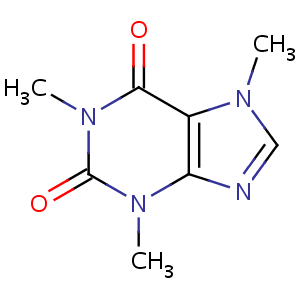
Caffeine Molecule: Courtesy of http://itech.dickinson.edu/chemistry/?cat=92
In our case-control study, we are defining case subjects as graduating students with a GPA greater than or equal to 3.5, and we are defining the control subjects as graduating students with a GPA less than 3.5. After starting with our case and control subjects, we will be looking retrospectively at whether these students consumed a great deal of caffeine or not. Therefore, we are defining exposure to high levels of caffeine as at least 1-6 servings per week of a caffeinated drink, while we are defining non-exposure to high levels of caffeine as 1-3 servings per month or less of a caffeinated drink. These stratified measures were developed by Chan, Wang and Holly (2009) from a 131-item food questionnaire obtained and validated by Harvard University.
Methods
For this case-control study, we will interview 500 graduate and undergraduate students. These 500 students will be made up of 100 from the University of Missouri – Columbia, 100 from the University of Washington – Seattle, 100 from the University of Alabama – Birmingham, 100 from the University of Connecticut, and 100 from Harvard University; this is designed to make the results of the study more applicable to the entire United States. The first 50 students from each school will be exclusively case subjects, and then later 50 controls will be selected via group matching and interviewed in the same manner. In this study, we will be group matching for the characteristics of: age, gender, race, BMI, and smoking. We will be conducting one-on-one sound-recorded interviews on all four campuses asking an array of questions that should take about thirty minutes per student, for a total of 250 hours of interviewing. Such an interview process will require a number of interviewees interviewing students simultaneously in different rooms. Each student will be compensated $20 for the thirty-minute interview.
The thirty-minute interview will encompass questions surrounding the students’ GPA scores and their typical behavior or lifestyle over the length of their undergraduate or graduate careers. Questions will specifically address the students’ sleep habits, study time, diet (amount of high-protein foods, high-fiber foods, sweetened foods etc.) credit hours per semester or quarter, major of study, exercise (aerobic and/or anaerobic), and use of other cognitive enhancers (such as Ritalin and Adderall), as we will be accounting for these possible cofounders in the analysis of our results. We will then ask the students about their GPA scores. Finally, we will ask the students about their specific consumption of caffeinated drinks.
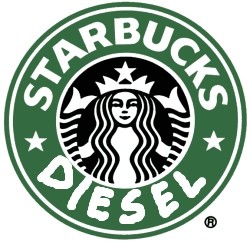
Courtesy of http://spbcar.ru/news/en/category/etc/3?page=128
With respect to the students’ consumption of caffeine, we will specifically ask them about regular coffee, black tea, green tea, energy drinks, hot cocoa, caffeinated soft drinks, and finally decaf-coffee, decaf/herbal tea and decaf soft drinks for comparison purposes. We will measure caffeine consumption via the number of servings, which will be stratified into the categories of 1 serving per month, 1-3 servings per month, 1-6 servings per week and greater than or equal to 1 serving per day. Again, these stratified measures were developed by Chan, Wang and Holly (2009) from a 131-item food questionnaire obtained and validated by Harvard University. With this information we will be able to determine whether each case and control has had exposure to high levels of caffeine. Furthermore, we will be able to calculate an odds ratio, which will tell us the odds that a case was exposed relative to the odds that a control was exposed. Again, case subjects have GPA scores greater than or equal to 3.5, and exposure is defined in this study as consuming at least 1-6 servings of a caffeinated drink per week (please see the excel template for our layout).
CLICK HERE to view how we would organize these results (Excel)
Causal Association
Strength of the Association
- Via our odds ratio calculations, we will be able to determine the strength of the association between the “exposure” and the “disease.” In this case, if the odds ratio is greater than one, with the 95% confidence level consisting of values above the value of one, then we can infer a causal association and determine its strength.
Dose-Response Association
- Via comparing the amount of caffeine consumption and the students’ GPA scores, we may be able to determine a dose-response relationship.
- Coffee has been proven to enhance cognitive performance in a dose-response relationship (Jarvis, 1993).
Biologic Plausibility
- Caffeine is well known to enhance concentration and alertness (Nehlig, 2010), which may hence directly or indirectly enhance cognitive abilities.
- Caffeine and its metabolites have been proven to enhance human cognitive functionality (Butt & Sultan, 2011).
Challenges and Limitations
There are several challenges we expect – some are the nature of the case-control study and some are more specific to our approach and topic. First of all, how will we account for different concentrations of caffeine in all those drinks? Some are standardized (soda drinks, coffee from coffee-shops like Starbucks, etc.), but many people make their own coffee. And some people also add sugar (and different amounts of it), which is another stimulant.
Going further with this, will people remember how much of each drink they consumed? And how high the caffeine levels were in their home-made coffees and how much sugar they added? These issues, known as recall bias, are one of the characteristic weaknesses of case-control studies.
The next set of issues will come from what is known as selection bias. We have decided to spread the research and include universities from various parts of the USA to minimize the effect of the geographical area, but the question remains – can we generalize our results and say they are valid for all universities? We have decided to include Harvard because it is one of the best universities in the world. It will be interesting to see what kind of caffeine consumption they have and whether that has anything to do with their outstanding results. However, a broader study (including more colleges, like community colleges, and even high schools) might improve our understanding of whether there is a connection between caffeine consumption and attending college in the first place.
Continuing with selection bias issues, we have to be careful when selecting people for the interview. We might get a sample that is not representative of that particular university. For example, if people who agree to participate have something in common (for example, an interest in research, such as the one we are doing with this study), we might end up with a higher GPA sample. Or maybe the people who refuse to participate have something significant in common… These issues can be called non-response bias and we should keep them in mind when selecting our cases. Controls are going to be matched to the cases anyway; however this will bring some more problems into the picture. Namely, the factors we choose for matching the groups cannot be accounted for in the analysis (because we will artificially establish proportions that will be equal between cases and controls).
There are some other issues we see that could potentially affect the validity of our study. What are the risks connected with high caffeine consumption? There are known health risks (for example cardiovascular issues), but what about developing tolerance? This might lead to even higher caffeine consumption, which then disrupts the sleeping pattern and can lead to a decrease in cognitive performance. There might be other issues, such as combining caffeine with other cognitive enhancers, or even medications. And then is a whole set of issues connected to differences in culture and socio-economic status. Not only do these differences account for different caffeine consumption (quantity and quality), but they introduce other behavioral differences and we cannot control for everything.
And last, but not least, where will we get the money for our research? If we interview 500 students and give $20 each, that is $10,000 already (and we do not even get paid ourselves…)! Coffee companies (Starbucks, Caribou, etc) might be interested in sponsoring this, however this will introduce another possible bias – will this stimulate us to find a positive connection between caffeine consumption and GPA? This is definitely worth considering.
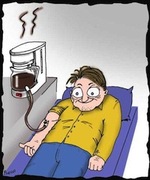
Courtesy of http://www.diet-blog.com/
Self-Reflection
Designing a study is tough! There are so many different things to think about that it can become overwhelming. After we had decided on what we wanted to study, we had to agree on a study design. Each type of study has its own set of upsides and downsides, so we really had to sit down and decide which downsides we could live with and which upsides were the most important for our results. We had originally decided on a prospective cohort study, but this proved to be a less than optimal option. If this type of study was to be undertaken, we would have to follow participants for some time. This could affect the use of caffeine for participants, which we didn’t want. Another difficulty with cohort studies (both retrospective and prospective) is that we start with the exposure and participants are separated by this. We decided that this would be difficult considering the varying amounts of exposure (caffeine consumption). An intervention study would provide stronger evidence, but is probably unethical to make people drink coffee. So, we finally decided on a case-control study. While it lacks some of the strengths of other studies (temporality, lower recall bias, etc.), we decided a case-control study would be the most manageable study to perform. Another problem we came across was how detailed to go with GPA. Should we have just two GPA groups or more than two GPA groups? What GPA should be the cutoff for the GPA groups? We finally decided that to keep it simple and easier to analyze we would use just two groups. Thinking of all the possibly confounders was also difficult (we obviously didn’t think of all of them), and there were many challenges and limitations to address (discussed earlier). Overall, we realized that designing a study to accurately portray what the researchers are looking for (without too much outside interference) is really difficult, and some sacrifices and tradeoffs have to be made.
So What?
Why is this study worth doing and what could come from positive results? Well, let’s just assume that there is a correlation between caffeine consumption and GPA. For one, this will lead to increased research on caffeine’s affect on cognitive abilities. We understand the limitations of our study and that causation cannot be proven from just our study, but if positive results are found perhaps causation will be found in a later study. Looking at this from a limited prospective, we could maybe eventually say that caffeine helps students more efficiently learn and therefore increase their GPA’s. From a broader prospective, we may one day be able to say that caffeine helps people in general work and learn more effectively. This of course would likely have many effects, some unwanted. Companies may encourage caffeine use without thinking about the additional effects on people cause by other factors (what type of caffeine, amount, etc.). Companies producing sodas or similar products high in caffeine may market themselves as “good for the mind,” even though they could have other negative health effects. With obesity being a major issue, promoting sodas as “good for you” may not be something we as a country would want. However, there could be positive results as well. Students and other individuals could use caffeine to help themselves become better in the classroom and better in the workplace. Caffeine could also be used as a safer option than other, illegal options that some students use for help in school (i.e. Ritalin, Adderall). At this juncture, it is difficult to say what kinds of changes could occur with a discovery of a positive correlation between caffeine and GPA, but it may lead to further studies that could benefit students and workers (and yes, possibly companies selling caffeine products) in their professional lives.
~~~~~~~~~~~~~~~~~~~~~~~~~~~~~~~~~~~~~~~~~~~~~~~~~~~~~~~~~~~~~~~
References
Butt, M., & Sultan, M. (2011). Coffee and Its Consumption: Benefits and Risks. Critical reviews in food science and nutrition , 51 (4), 363-373.
Chan, J., Wang, F., & Holly, E. (2009). Sweets, Sweetened Beverages, and Risk of Pancreatic Cancer in a Large Population-Based Case-Control Study. Cancer Causes Control , 20, 835-846.
Gordis, L. (2009). Epidemiology (4th Edition ed.). Philadelphia, PA, USA: Saunders Elsevier.
Jarvis, M. (1993). Does Caffeine Intake Enhance Absolute Levels of Cognitive Performance? Psychopharmacology , 110 (1-2), 45-52.
Nehlig, A. (2010). Is caffeine a cognitive enhancer? Journal of Alzheimer’s Disease , 20, S85-94.


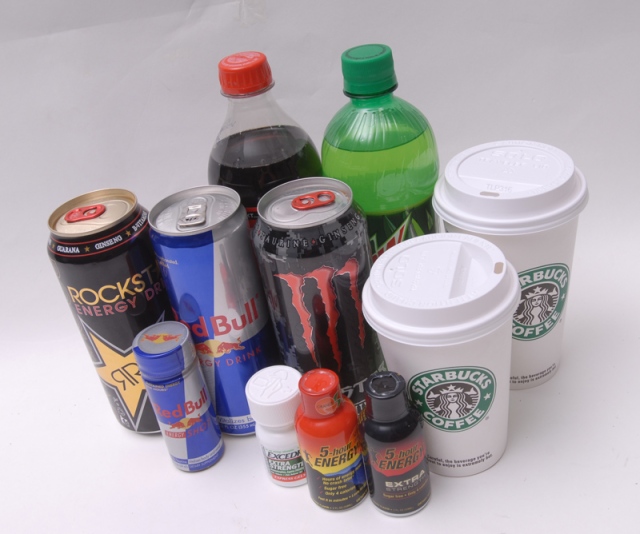

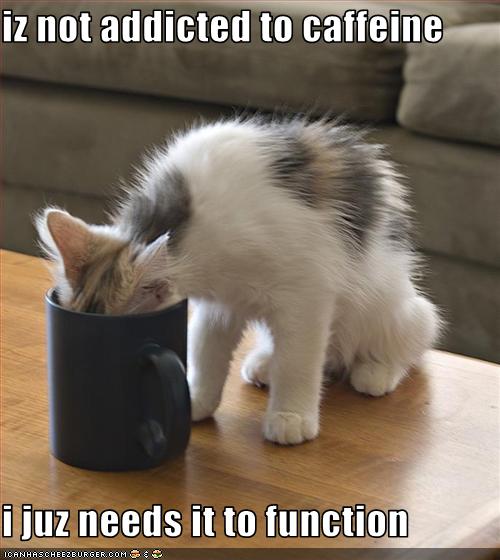

• Anthony, I think this is a great subject matter. I can tell you that I didn’t start drinking coffee until I came to graduate school. I can definitely say it is associated with better grades because without it I’m not sure I could function well enough to complete homework. Haha. Of course, I would always do the epidemiology homework, coffee or not. 😉
• Love the movie! Adenosine is not my friend. Without it I could do so much.
• I was wondering why you used interviews instead of a questionnaire?
• I really like the excel sheet as well. Shows you and Jure put a lot of work into this design. Looks like you are ready to start this study now.
• I think this is a great study, but I am always trying to thinking of ways to stay awake other than coffee because it isn’t healthy for you. Did you read anything about how coffee affects your body in other ways or maybe ways to get by without coffee? Maybe this could be your introduction to your paper that you will write in the future. 🙂
Mary, who says coffee is not healthy for you? As far as I know, the jury is still out on this one; however EXCESS was NEVER beneficial to human bodies, so that’s my guideline… I’m a coffee junkie since ACHE in Chicago and am actively working on kicking the habit.
You want coffee replacements? Exercise and water. I just realized we did not account for water-drinking in our study design! Definitely worth including (how much water do people drink daily). The 8-cup theory sounds nice, but I’m not sure it holds water (pun intended). And with exercise… well, just taking a walk can be sometimes enough… find what suits you, but moderation is the key, as always! I’m sure people found other replacements, but these two worked for me in the past… I thought of trying yoga and/or meditation (damn, two more confounders we did not consider!), but they take even more time than exercise… I wouldn’t consider tea as a replacement/solution, because its status is similar to that of coffee… One thing worth considering, though, is not adding milk and sugar to your coffee (or tea!)… Neither is really necessary and, while debatable, both can be considered unhealthy… Creamers – possibly even worse…
Other influences:
– proper diet. Big meals full of carbs and/or protein will slow you down (in my experience). Eat less, eat more fruits and veggies and eat more often, and you will feel less tired in the first place.
– enough sleep. I guess I don’t have to explain this one… Also, power naps improved my life greatly 🙂 Especially when I eat too much for lunch, hehe
But yes, grad school and poor time management might require more coffee drinking than one would want… I’m trying my best, but coffee is sooo convenient 🙂 However, before Chicago, I did just fine (of course it was not the end of the semester), so I’m positive I will tie the score again (right now, it’s 2:1 for coffee).
People on average also feel more compelled to tell the truth when they are answering questions one-on-one relative to paper or computer-based questionnaires.
Well, being from Seattle, I started drinking coffee as a freshmen at UW, and I think it’s fair to say that I needed it to function on a daily basis. In fact, I used to arrange my day based upon when and where I would buy my daily Americano (much stronger than typical drip coffee), but I have to say that I truly enjoy and crave coffee. My mother never goes a morning without her routine Americano, but my father on the other hand, has never drank coffee, and he was born and raised in Seattle 🙂
Now that I have been in graduate school, my coffee consumption has actually decreased, as I have focused on exercising, maximizing water consumption, and going to bed and getting up in the morning at the same time everyday…which I think helps. If I do drink coffee, and occasionally I do, I usually drink decaf now, because sometimes I just crave the taste of coffee.
I find that when I do drink regular coffee I definitely feel more alert and sense that I am more productive, but once the caffeine kick dies off, I sometimes feel like crap, and can’t recover until I eat something. Also, if I drink regular coffee too late in the day, like after noon, I find that I am unable to sleep well that night (I suppose timing of caffeine consumption is another confounder that we didn’t consider when we designed the study).
reading this and drinking my second coffee today (i keep falling off the wagon…), I’m thinking how developing tolerance will influence the results… in a way, we could account for it with dose-response, but a biological explanation is needed to better understand the relationship…
I remember back in college, coffee did nothing for me anymore… I had to have my morning cup, otherwise I’d develop a headache, but that was it… Fast-forward a couple of years later (actually during my last year of college), I quit drinking coffee regularly and after a week or so, I felt the same as before…
An interesting study would be examining the placebo effect… Give people regular coffee and decaf and see what happens 🙂
Measuring coffee consumption is tricky because it varies throughout the week/month for most people. I think the most difficult measurement will be the actual amount of caffeine people intake. People may have no idea how much caffeine they are really drinking… some people still think Sprite has caffeine in it! Another possible study design for measuring caffeine consumption and cognitive ability would be a randomized trial where participants would be split into groups (control and intervention) and would take a test measuring cognitive ability. Randomization would split up the groups. The intervention group would drink a cup of coffee before taking the exam, and the control group would drink a cup of water before taking the exam. This process could be completed three different times, and the cognitive test scores could then be compared. If the control group did not mind drinking a cup of coffee, do you think this would be an unethical study? Do you think this would be an accurate measure of the desired variables? Also, I think cognitive ability should be measured in other ways besides GPA… some people might be great test takers/paper writers, but not so smart in real-life situations…
We were specifically interested in GPA, because it’s important for students and it is, after all, an average grade. This leads me to think that the older the student, the more reliable the GPA (more grades) – some are good at math, some at social sciences, etc… A GPA accounts for all those different types of subjects and types of tests… Since different majors represent a different balance of all the courses taken, we would account for the major (as presented in the study). However it would also be interesting to compare how their GPA changes over the years, and compare that with their caffeine intake over these years!
But you are right, GPA measures only certain types of abilities. In fact, it would be interesting to compare the influence of caffeine on various types of performance. “Cognitive performance” is in fact ambiguous.
A direct, randomized test is problematic, however I would say it is doable. You get their consent to participate on the influence of caffeine (or coffee) on cognitive performance and tell them that some will get real coffee and some decaf. This I think is totally ethical and I see no problem with this. Randomization would take care of the selection bias (volunteers are always a bit different than general public) as cases would in fact be the same as controls, apart from what type of coffee they drink. Then you give them various tasks and tests and compare. However, you get less information, especially “longitudinal” data… People who drink a lot of coffee develop some kind of tolerance, which introduces a big problem – unless they drink more, they do not get any kick out of coffee anymore… a GPA is at least a couple of years of measurements so you can examine these effects more in detail…
It would be interesting to have a cohort study and account for all these possibilities. You’d have to have a lot of money, but it’s possible. Or you can do a mental exercise – I would say that in the long run, coffee is not a solution, because you ruin your health when trying to counter the tolerance your organism builds. But this is an opinion, not science 🙂
I agree with you in that a randomized trial would be a great way to conduct our study, in fact we considered it for a while. However, I don’t think that testing caffeine effects on students right before taking a test is the best route. First, I do think that there would be ethical issues with some individuals being asking to consume caffeine while others are prohibited from it. Some may consume caffeine regularly, and not having caffeine might bring on adverse effects (like the shakes), while others that normally don’t consume caffeine would be “juiced” up and unable to concentrate as a result. Furthermore, we really wanted to see the long-term effects of caffeine consumption, not just right before an examination. In other words, we wanted to look at how caffeine affects both studying and test-taking… Of course, it all depends upon when the student usually consumes caffeine, and thus the “when” is another confounder in our design.
There are surely other ways to measure cognitive ability, but we chose GPA because it’s measurable and objective.
I think it is interesting that you decided to use both undergraduate AND graduate students. I assume that you will stratify the results for these two groups? I believe that these two groups have inherent characteristics that will influence their GPA behavior, apart from their caffeine use. Grad students, by virtue of being accepted into a grad program and being required to maintain a higher GPA, are probably more likely to have a high GPA. Undergraduates are all over the board…some of the them can’t even make the grades to stay in school. If I were conducting this study, I might only study the undergraduate population, as these students have more variability in their grades. Just a thought.
Overall I think you designed a very thoughtful study! It’s hard to even come up with things that you did not consider. I like your choice of schools and the variety between the schools being studied. Your excel spreadsheet is very nice. Good job!
Thank you for the comments Melissa! We actually debated for a while as to whether to include only undergraduate or graduate students, or to include both. In addition to the 2 groups of students having different degrees of motivation and drive, we also considered the fact that Masters students are only in school for 2 years at a time, while undergraduate students are in school for 4 years at a time, and whether or not this would affect our results. Thus, you are right; we definitely would need to stratify our results with respect to whether the students are undergraduate or graduate students.
One of the questions I have for you guys, is the potential to follow up a campus where there is no coffee shop, yet. If you could find some campuses, probably smaller private schools or similar where there aren’t yet large scale coffee shops or they are just putting in a student union, it would be neat to monitor an overall increase or decrease in GPA relative to that addition.
Your considerations of limitations and strengths are excellent. I like the way you controlled for a lot of confounders, especially drug enhancement, because I have learned since coming to graduate school that there are plenty of students who take such medications just to study or prep for exams. This could really influence the results of the study.
I like the idea of a case by case interview, but the recall involved is quite staggering here. I wonder if using a more encompassing view, like the introduction of a new shop I mentioned, or a holistic measure of coffee sales to students vs. campus wide GPA could show us some of the associations before we spent many thousands of dollars?
Just a couple thoughts, but your blog is great. Nice work guys!
Thank you for the comments Aaron! Your idea is interesting with respect to finding campuses that don’t have coffee shop yet, and then when they do, comparing the different overall GPA scores. First, this would be really hard to do, since I’ve never heard of a college campus not having multiple coffee shops. Second, and most important, I fear there would be a great number of confounders, including different student bodies in general. Furthermore, by conducting the study like this, it sounds more like an ecological study, thereby giving us more aggregated data, which cannot be applied at the individual level.
And yes, the recall bias of our study would be significant, and we would have to account for this.
Guys, great topic for a study! I just recently started drinking coffee regularly and I have been curious about any positive or negative affects it might have on my academics. When reading your study the things that stood out most to me was: how can you control for ALL of the confounding factors? This study in particular seems to have a large number of confounding factors, even outside of the ones you have decided to screen for in the interview. What about psychological issues, personal problems (death of a family member, tough break up, etc.), or even a personal injury? So many different factors come into play when looking at GPA and performance in school. Would it be beneficial to perform a study that incorporates randomization in order to better control for such factors?
Great job guys!
Pat
I also wanted to commend you guys on the thought put into the biological plausibility and controlling for different drink sizes. I never realized that studies already existed showing that caffeine can have a positive effect on cognitive performance. I just thought it allowed to to stay up later! Controlling for drink sizes would be difficult as well, especially with the chance for recall bias. The way you would stratify the results reminds me of the manner in which they measure green tea consumption in the breast cancer study. One last comment/question, doing group matching seems like it would be an incredibly time-consuming and expensive process. I would be concerned that you would be able to find enough people to participate in the study while also matching them. Any thoughts/comments?
Thank you for the comments Pat! Yes, there would be a great deal of confounders in our study. With respect to other “psychological” confounders, this is indeed an issue. However, the truth this, these are confounders that are potentially present in just about every kind of study, whether the “disease” is GPA, health, mortality etc. Randomization on the other hand, might help in this manner, but we felt that a case-control study was more appropriate for practical and financial reasons. We also didn’t want to confront any ethical issues involved in randomization.
With respect to group-matching, it would indeed be financially and time consuming. We would need to have a system in place to make this matching more streamlined. One way we could do this is by having subjects refer us to their friends, as studies have shown that people spend a great deal of time with other people that are similar to themselves in certain demographics and other characteristics. So that might be one way.
@Melissa: Sure, we would differentiate between the two groups, as well as between various programs/majors.
@Aaron: That is a possible design (new campus w/o coffee shops) or a prospective cohort study (any campus). The problem with the first one is that people can either make coffee at home or buy it pretty much everywhere else, and we should not forget other sources of caffeine too!
I like your idea of a broader study first (like a cross-sectional maybe?), to get sufficient funding for what we had in mind (or something in that fashion)!
@Pat: Randomization would be cool and to a certain degree, we can incorporate it with our study, when we select our subjects. On the other hand, the interview format allows for investigating potential confounders, such as the ones you mentioned.
Great point on matching – we might in fact find it necessary to reduce the number of factors (and rather use them for analysis, which could prove to be beneficial) and only match based on three of them…
Great study, guys! I personally quit drinking caffeinated coffee when on my surgery rotation in med school–you have to get up before 4 am (obviously coffee would be helpful there) but my hands were just slightly shaky while in the OR. Not so good.
I agree with comments about GPA not being a narrow enough measure to truly “see” the effect of something as small as a few cups of coffee per month. Is GPA even comparable between different majors (music major vs a math major, for example)? Some programs of study are dependent on cramming for tests and high pressure exams where caffeine and its stimulant effects would be helpful, but programs with longterm assignments and less focus on testing might be less affected so you lose your ability to detect a difference. My understanding of how caffeine does improve cognition is that it is quite short-lived in effect, so when the study subjects consumed the caffeine might be important to know as well.
Thank you for the comments Laura! Is GPA the best measure of cognitive behavior? Probably not, but it is easy to measure, it’s objective, it’s easy to obtain, and very applicable to college students. With respect to the different major types, we would probably stratify individuals based on their specific major (along with a few other traits) as Jure suggested above. Also, the timing of caffeine consumption is also very important as you point out, which would indeed be a confounder, as others have pointed out above. Also, while caffeine effects may be short-lived, I have read that it can help individuals memorize and perform better during that short-period which could have long-term effects and benefits.
I really enjoyed reading this study and the pictures and videos were very helpful and entertaining to say the least. They helped keep me “glued” to your subject matter and now I feel like I should go drink a cup of coffee to see how it will affect my study habits tonight.
In terms of critiquing and providing feedback for your study, I think you should include colleges from urban, suburban, and rural areas to be more generalizable with your results and to see what population drinks more or less caffeine. While I think that this is a good study, I am afraid that if the results are positive and caffeine consumption has a positive effect on grad students’ GPA. Students will increase their caffeine consumption to obtain a higher GPA, which in return could result in adverse health effects and concerns.
Thank you for the comments Mary! I like your suggestion with regards to choosing schools that different in city-type in addition to schools that differ in geographic location. While the schools that we chose are all based in mostly urban areas, this is something that is common among them, thereby eliminating another possible confounder, urban vs rural etc.
Hopefully, if the results of this study are in agreement with our hypothesis, this would bring about additional studies that would look closer into the amount of caffeine that is most beneficial, hopefully then finding a standard amount of caffeine that is safe and most beneficial for cognitive abilities.
I don’t think urban vs rural counts as much when it comes to the geographic location of a university; however, it is a factor when it comes to lifestyles and habits of people from these different locations. On the other hand, as long as we account for these differences in our study, we would still have pretty generalizable results, assuming various kinds of people would be represented in our sample.
A very good point on the effect of the study: will it drive consumption up (if positive association is found)? We should include some information regarding the negative effects of caffeine consumption, but in the end, the decision lies with the individual. Avoiding a study for such a reason would be pointless, we cannot live in fear. In fact, fear is usually the result of ignorance. Again, what is needed is balance – like a study providing good and reliable information on why caffeine is bad. The problem could be in media (and other institutions, even educational) reporting and teaching just a part of this picture…